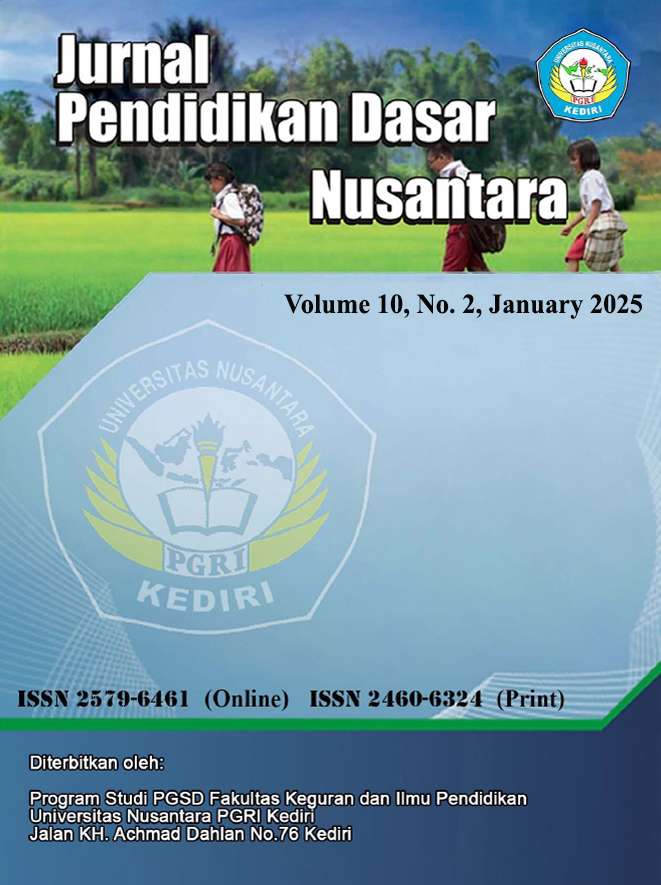Building Early Childhood Social Skills Through Learning Empathy Cooperation and Responsibility
DOI:
https://doi.org/10.29407/jpdn.v10i2.24435Keywords:
Social Skills, Early Childhood, Empathy, Cooperation, ResponsibilityAbstract
Instilling social skills in early childhood is an important part of character building and healthy social interactions in the future. This article discusses the importance of developing social skills in early childhood through learning about empathy, cooperation, and responsibility. Through the right approach, children can learn to understand the feelings of others, work together in groups, and feel responsible for their own actions. This study began by formulating the objectives and focus of the study, namely to explore how learning empathy, cooperation, and responsibility can build social skills in early childhood. After that, a literature review was conducted to deepen understanding of the theory of child social development and learning methods that can be applied. The subjects of this study were children aged 4-6 years, teachers at ABA 02 Bumiaji Kindergarten, and parents of children. Instilling the values of empathy, cooperation, and responsibility from an early age is expected to form a strong foundation for better social development in children, improve communication skills, and create a more harmonious social environment. Therefore, education that integrates these social skills is very important to equip children with the ability to adapt and contribute positively to society in the future.
Downloads
References
Aghnaita, & Irmawati. (2022). Bahaya Perkembangan Sosial Emosional Anak Usia Dini. Jurnal Ilmiah PESONA PAUD, 9(1), 1–11. http://ejournal.unp.ac.id/index.php/paud/index
Agusniatih, A., & Manopa, J. M. (2019). Keterampilan sosial anak usia dini: teori dan metode pengembangan. Edu Publisher.
Ana, L. N. (2020). Mengembangkan Kreativitas Anak Usia Dini melalui Permainan Konstruktif. 7(3), 839–849. https://doi.org/10.31004/aulad.v7i3.
Blegur, J. (2020). Soft skills untuk prestasi belajar: Disiplin percaya diri konsep diri akademik penetapan tujuan tanggung jawab komitmen kontrol diri. Scopindo Media Pustaka.
Jazilurrahman, J., Widat, F., Widat, F., Tohet, M., Tohet, M., Murniati, M., Murniati, M., Nafi’ah, T., & Nafi’ah, T. (2022). Implementasi Metode Bercerita dalam Meningkatkan Kecerdasan Interpersonal Anak Usia Dini. Jurnal Obsesi : Jurnal Pendidikan Anak Usia Dini, 6(4), 3291–3299. https://doi.org/10.31004/obsesi.v6i4.2095
Mesra, R., & Tuerah, P. R. (2024). Efektivitas Program Pendidikan Karakter dalam membentuk Perilaku sosial siswa : Studi Kasus Manajemen Kurikulum Terpadu. 1, 109–115.
Nastiti, P. T., & Wathon, A. (2019). Membangun Pembelajaran Berbasis Proyek Melalui Kegiatan Bermain Alat Permainan Edukatif. Sistim Informasi Manajemen, 2(1), 161–187.
Ningsih, E. P. (2024). Peran Interaksi Sosial dalam Pengembangan Keterampilan Sosial Anak Usia Dini: Studi Kasus di Taman Kanak-Kanak. Journal of Gemilang, 1(1), 1–7. https://doi.org/10.62872/tpvbw823
Pahleviannur, M. R., De Grave, A., Saputra, D. N., Mardianto, D., Hafrida, L., Bano, V. O., Susanto, E. E., Mahardhani, A. J., Alam, M. D. S., & Lisya, M. (2022). Metodologi penelitian kualitatif. Pradina Pustaka.
Prabandari, I. R., & Fidesrinur, F. (2021). Meningkatkan Kemampuan Bekerjasama Anak Usia 5-6 Tahun Melalui Metode Bermain Kooperatif. Jurnal Anak Usia Dini Holistik Integratif (AUDHI), 1(2), 96. https://doi.org/10.36722/jaudhi.v1i2.572
Prastiwi, R., & Wathon, A. (2019). Membangun Pembelajaran Agamis Melalui Kegiatan Bermain Alat Permainan Edukatif. Sistim Informasi Manajemen, 2(1), 48–78.
Puspitasari, R. N., Iswarini, B. D., Astika, D. D., & Ningrum, P. W. (2023). Karakter Disiplin dan Tanggung Jawab Anak Kelompok B TK Muslimat Nu 001 Ponorogo. Jurnal Ilmiah Potensia, 8(2), 304–311. https://doi.org/10.33369/jip.8.2.304-311
Rusmiati, E. T. (2023). Penanaman Nilai-Nilai Toleransi pada Anak Usia Dini. ABDI MOESTOPO: Jurnal Pengabdian Pada Masyarakat, 6(2), 248–256. https://doi.org/10.32509/abdimoestopo.v6i2.3077
Sugiarto, & Farid, A. (2023). Literasi Digital Sebagai Jalan Penguatan Pendidikan Karakter Di Era Society 5.0. Cetta: Jurnal Ilmu Pendidikan, 6(3), 580–597. https://doi.org/10.37329/cetta.v6i3.2603
Suryana, D. (2021). Pendidikan anak usia dini teori dan praktik pembelajaran. Prenada Media.
Suttrisno, M. P. (2023). BAB 2 Pendekatan dan Interaksi Dengan Anak Usia Dini. Pendidikan Anak Usia Dini, 13.
Tasya, N., Syamsurizal, Arsih, F., & Anggriyani, R. (2023). JOTE Volume 4 Nomor 3 Tahun 2023 Halaman 242-250 JOURNAL ON TEACHER EDUCATION Research & Learning in Faculty of Education. Validitas Modul Ajar Hereditas Manusia Berbasis Problem Based Learning (PBL), 4, 242–250.
Ulfah, S. M., Asdar, A., & Nurdiyah, N. (2023). Penggunaan Metode Bercerita Berbasis Kearifan Lokal untuk Meningkatkan Karakter Tanggung Jawab Anak. Jurnal Obsesi : Jurnal Pendidikan Anak Usia Dini, 7(5), 5351–5358. https://doi.org/10.31004/obsesi.v7i5.3737
Waruwu, M. (2024). Pendekatan Penelitian Kualitatif: Konsep, Prosedur, Kelebihan dan Peran di Bidang Pendidikan. Afeksi: Jurnal Penelitian Dan Evaluasi Pendidikan, 5(2), 198–211. https://doi.org/10.59698/afeksi.v5i2.236
Widyana, T. C., & Nugrahanta, G. A. (2021). Peran Permainan Tradisional Terhadap Karakter Empati Anak 6-8 Tahun. Jurnal Basicedu, 5(6), 5445–5455. https://doi.org/10.31004/basicedu.v5i6.1585
Downloads
Published
Issue
Section
License
Copyright (c) 2025 Yayak Khatijah, Windarti Windarti, Daroe Iswatiningsih (Author)

This work is licensed under a Creative Commons Attribution-ShareAlike 4.0 International License.
Authors who publish with this journal agree to the following terms:
- Copyright on any article is retained by the author(s).
- The author grants the journal, the right of first publication with the work simultaneously licensed under a Creative Commons Attribution License that allows others to share the work with an acknowledgment of the work’s authorship and initial publication in this journal.
- Authors are able to enter into separate, additional contractual arrangements for the non-exclusive distribution of the journal’s published version of the work (e.g., post it to an institutional repository or publish it in a book), with an acknowledgment of its initial publication in this journal.
- Authors are permitted and encouraged to post their work online (e.g., in institutional repositories or on their website) prior to and during the submission process, as it can lead to productive exchanges, as well as earlier and greater citation of published work.
- The article and any associated published material is distributed under the Creative Commons Attribution-ShareAlike 4.0 International License
































